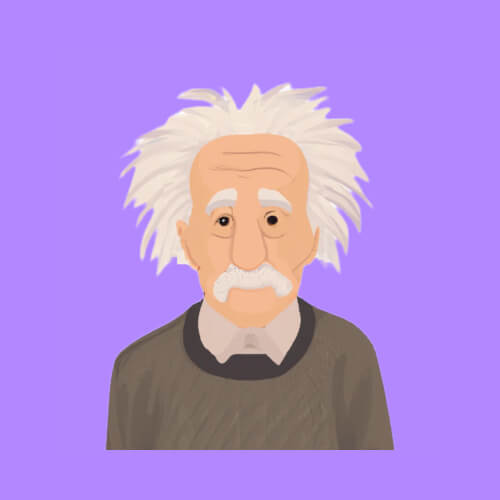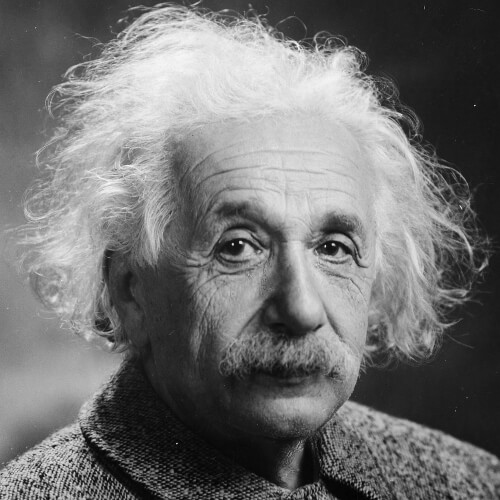



Albert Einstein (14 March 1879 - 18 April 1955) was a German-born theoretical physicist, today widely regarded as one of the most important scientists of all time.
For his groundbreaking work on space, time, and gravity, he received the Nobel Prize in Physics in 1921 and was chosen as Time Magazine's Person of the 20th Century.
Einstein was born in 1879 in Ulm, Germany. His father, Hermann Einstein, was manager of an electronics factory, and his mother, Pauline Koch, was a talented pianist.
Though Einstein struggled in school, he had an insatiable curiosity for learning, teaching himself algebra and geometry at age 12, and later calculus at age 15. Fascinated by a compass his father gave him, at only 16 he published his first scientific paper about the behavior of electric fields.
In 1895, Einstein's family moved to Zurich, Switzerland, where he began to attend the Swiss Federal Polytechnic School.
In 1905, while working as a patent clerk, Einstein published a paper called On the Electrodynamics of Moving Bodies, which introduced the idea that the speed of light is always measured the same, no matter how fast the measurer is moving. This new idea resulted in amazing discoveries, such as the fact that time actually passes at different rates for different objects.
It also led to Einstein's most famous equation, E = mc2, which shows that a small amount of matter (m) can be converted to a huge amount of energy (E), where c2 is the speed of light multiplied by itself—a mind-boggling large number.
Einstein's work on Special Relativity was just the beginning, though. He went on to develop the Theory of General Relativity, which proved that gravity is not exactly a force between objects, as Isaac Newton had thought in the 1600s, but rather the result of the bending of space and time by enormous objects like planets and stars.
In 1933, just before World War II, Einstein fled Nazi Germany for the United States, and became a professor at Princeton University in New Jersey. He became a US citizen in 1940 and later in life spoke out against war, nuclear weapons, and even discrimination. Einstein passed away in 1955, but his work and legacy can be found almost everywhere you look.
For the scientist, sailing was an escape, "from the cares of the world." One of his most famous boats was named Tinef which is a Yiddish word meaning "worthless" or "junk." Einstein named the boat this because he purchased it secondhand for a low price and thought it was in poor condition. On one occasion, while sailing on the boat, Einstein's hat flew off his head and into the water. He was so attached to the hat that he jumped in after it, refusing to let it sink.
After Einstein's death in 1955, his brain was removed and preserved for scientific study to better understand his exceptional intelligence. Although it is still a topic of debate whether his brain was actually different from that of an average person, researchers have identified several unique features in Einstein's brain, including a greater number of glial cells in certain areas associated with mathematical and spatial reasoning.
Einstein was known for his unconventional habits, including his extreme dislike of socks. The great scientist believed that wearing socks restricted the circulation of blood in his feet, which he said caused him discomfort. In fact, Einstein was often seen wearing sandals or going completely barefoot, even in cold weather. His annoyance with socks was so strong that he once even wrote a letter to his wife, Elsa, asking her to send him a few pairs of sandals so he could go sock free.
If you're like most English speakers, you pronounce the st in Einstein similarly as in words such as "stone", or "stick." In German, however, st almost always makes a scht sound. So, Einstein is actually more correctly pronounced "Ein-Schtein"!
Another myth that's often spread about Einstein is that he didn't start talking until he was about 4 (most kids start talking before their 1st birthday). While it's still possible that he didn't start speaking until later in his life, a published story from his grandparents show his curious mind already at work by age 2. After meeting his new baby sister for the first time, little Albert, imagining her as some new toy to play with, said, "But where are its wheels?"
In 1952, Einstein was offered the ceremonial position of becoming the second President of Israel, then a relatively new country. He reluctantly decided to turn down the offer, stating that he had, "Neither the natural ability nor the experience" for the job.
Einstein's name often incorrectly appears on lists of famous left-handed people, possibly because of a misinterpretation of a photograph. In the photograph, Einstein appears to be writing with his left hand, but upon closer inspection, it's clear that he's holding a writing utensil in his right hand and resting his left hand on the desk.
There are many other photographs and accounts that confirm Einstein's right-handedness, including notes from his childhood teachers, who describe him as a right-handed student. Sorry, lefties!
Einstein's political beliefs were a significant part of his public persona. He was a strong advocate for civil rights and spoke out against segregation and racism, particularly in the United States. In 1946, he gave a speech at Lincoln University in Pennsylvania, the first degree-granting historically black college in the United States, in which he praised the institution for its commitment to providing education to African Americans, calling segregation a "disease" that he did "not intend to be quiet about."
In addition to his stance on civil rights, Einstein was also a pacifist, speaking out against war and violence. He was a vocal critic of the nuclear arms race and worked to promote disarmament and peace throughout his life. In fact, Einstein famously wrote a letter to President Roosevelt in 1939 urging him to fund research into nuclear energy, but he later regretted his role in the development of the atomic bomb and became an advocate for nuclear disarmament. Einstein believed that science and politics were closely intertwined and that scientists had a responsibility to use their knowledge to promote social progress and justice.
Einstein's decision to become a vegetarian was based on both health reasons and a deep compassion for animals. He suffered from stomach problems, and it is believed that he made the dietary change in the hopes that it would improve his health; however, he also believed in the ethical treatment of animals and was known to be deeply upset by the mistreatment of animals, once stating, "I have always eaten [meat] with a somewhat guilty conscience."
Einstein's vegetarianism was not very common during his lifetime, but he remained committed to it throughout his life. In a letter he wrote to German politician Heinrich Lübke in 1951, he expressed his belief that "the vegetarian manner of living... would most beneficially influence the lot of mankind." Einstein's commitment to vegetarianism was not just a personal choice, but a reflection of his values and his vision for a better world.
It's often mentioned that Einstein was a poor student and that he failed his university entrance exam. In reality, however, he took the test 2 years before most students—and failed only the parts that were given in French.
Einstein spent quite a lot of energy inventing and applied about 50 patents in his lifetime. One such patent was for a silent refrigerator that could supposedly last up to 100 years.
[1] Haney, L. R. (1985). Einstein and the Development of the Theory of Relativity. In E. R. Weaver (Ed.), The Papers of Albert Einstein, Volume 1: The Early Years, 1879-1902. Princeton University Press.
[2] Isaacson, W. (2007). Einstein: His Life and Universe. Simon and Schuster.
[3] McManus, I. C. (2009). Handedness, language dominance, and aphasia: A genetic model. Brain and Language, 108(3), 190-193.
[4] Kormos-Buchwald, D. (2017). Albert Einstein and Civil Rights. In F. Jackson & S. Weidner (Eds.), Einstein on Race and Racism (pp. 45-66). Springer.
[5] Rosenkranz, Z. (2018). Einstein as a Vegetarian. Einstein Archives Online.
[6] Rosenkranz, Z. (2018). Einstein the student revisited. Physics Today, 71(11), 40-46.
[7] Rhodes, R. (2010). The Making of the Atomic Bomb. Simon and Schuster.
[8] Pais, A. (1982). Subtle is the Lord: The Science and Life of Albert Einstein. Oxford University Press.